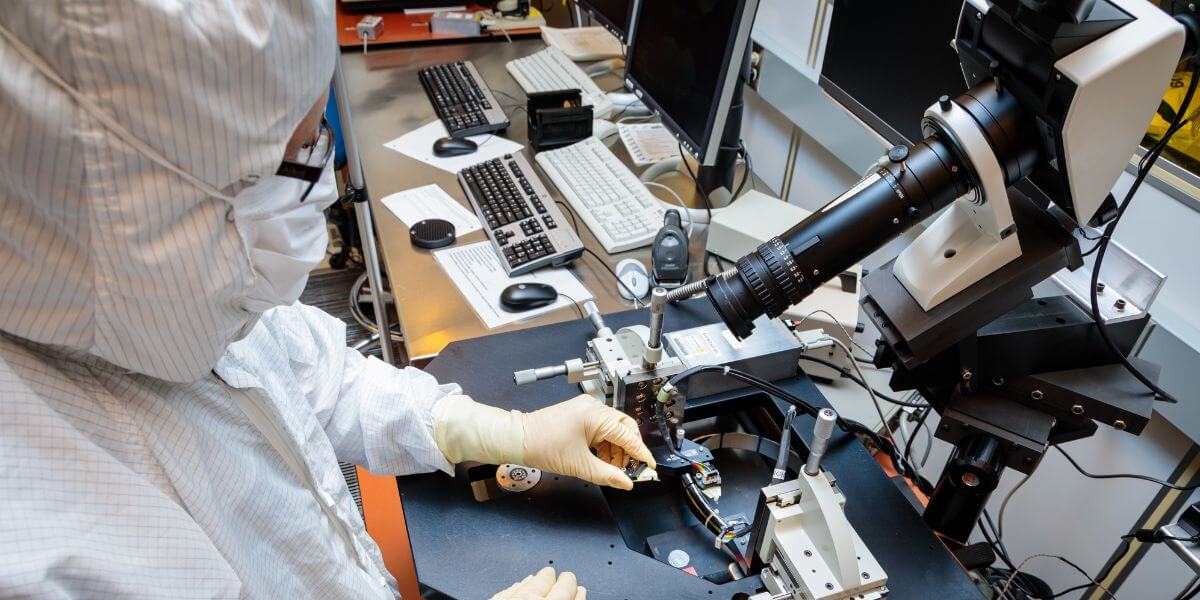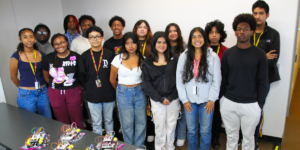
Photo credit: Northrop Grumman
The Department of Defense has awarded an additional $27 million from the CHIPS & Science Act to the California Defense Ready Electronics and Microdevices Superhub (CA DREAMS), a microelectronics innovation coalition led by the University of Southern California Viterbi School of Engineering. This continued investment, announced through the Microelectronics Commons, will further support CA DREAMS in advancing U.S. semiconductor capabilities by expanding its infrastructure, operations, and workforce development.
In its first year, CA DREAMS successfully established its core infrastructure and team, including the launch of MOSIS 2.0—an accelerated, end-to-end prototyping service for experimental and production microelectronics. Working collaboratively with its southern California partner institutions, MOSIS 2.0 enables U.S. companies and research entities to access advanced fabrication and prototyping resources with unprecedented ease and speed.
MOSIS 2.0 Expands to Incorporate More Hubs
The newly awarded funds will propel MOSIS 2.0’s expansion, integrating resources and services from additional hubs within the Microelectronics Commons. Success could lead to the nation’s most comprehensive network for microelectronics prototyping.
“The mission of the CA DREAMS Hub is to bring together advanced microelectronics capabilities and make them accessible across the nation,” said Steve Crago, CA DREAMS director and associate director of the USC Viterbi’s Information Sciences Institute (ISI). “This continued investment demonstrates the Department of Defense’s confidence in our ability to build the teams and technologies that will provide services to the DOD and the nation.”
Over the next year, MOSIS 2.0 will expand beyond its partners in the southern California area to integrate advanced technologies from two other hubs: the Southwest Advanced Prototyping (SWAP) hub, led by the Arizona Board of Regents on behalf of Arizona State University, and the Midwest Microelectronics Consortium (MMEC) hub in Ohio.
This cross-hub collaboration, comprising three out of the eight of the Microelectronics Commons innovation hubs, will give customers unprecedented access to a range of prototyping services that were previously unavailable through a single provider. “Now, a customer from anywhere in the country can come to MOSIS 2.0 and build a prototype that leverages technology from a combination of the SWAP, MMEC, and CA DREAMS hubs in addition to other foundries,” Crago said. “Furthermore, MMEC is providing the digital platform on which our MOSIS 2.0 services will operate.”
The expansion will bring significant technical capabilities to MOSIS 2.0, such as Sandia National Labs, a key partner of SWAP hub, which offers indium phosphide (InP) photonic integrated circuit multi-project wafer runs.
“SWAP hub is pleased to partner with CA DREAMS Hub on MOSIS 2.0,” said Jason Conrad, chief operating officer of SWAP hub. “The partnership demonstrates impactful collaboration across the Microelectronics Commons hubs and expands the technical offerings to more researchers that reduce cost, avoid duplication, and accelerate results.”
Continued Support for Current Projects and Partners
The CA DREAMS workforce development initiative will receive $1.5 million to lead the development of nationally recognized microcredentials for learners of all backgrounds to participate in the semiconductor industry. In addition, CA DREAMS will pioneer new ways to teach design and testing skills for faster growth of this important sector of the economy.
Another portion of the funding will be devoted specifically to the CA DREAMS Hub and its 16 partners from industry and academic organizations across Southern California. These funds will facilitate a series of collaborative “pipe cleaner” projects, whose goal is to streamline operations and integrate new technologies into the MOSIS 2.0 platform. Each advancement represents a step towards MOSIS 2.0’s financial self-sustainability.
Investing in MOSIS 2.0 also advances CA DREAMS’ recently funded technical projects. Announced in September 2024, and led by Hub partner Northrop Grumman, a leading global and aerospace defense technology company, these initiatives include a $16.2 million project to advance gallium nitride (GaN) technology and a $15.7 million project to develop 5G/6G-relevant prototypes. Together with the new operational funding, these awards bring CA DREAMS’ total 2024 Department of Defense investment to $58.9 million. The total funding since the launch of the project, in 2023, is $85.8 million.
“This investment places the southern California region at the forefront of microelectronics innovation,” said Yannis C. Yortsos, dean of the USC Viterbi School of Engineering. “Through CA DREAMS and MOSIS 2.0, we are creating a sustainable model that will strengthen America’s semiconductor capabilities for decades to come.”
Published on December 10th, 2024
Last updated on December 10th, 2024













